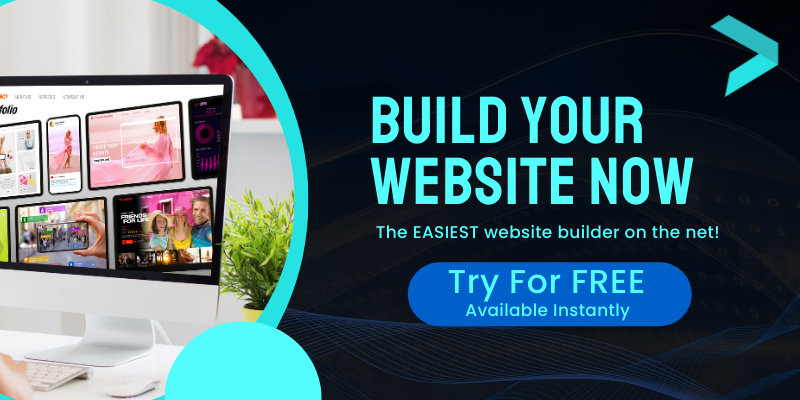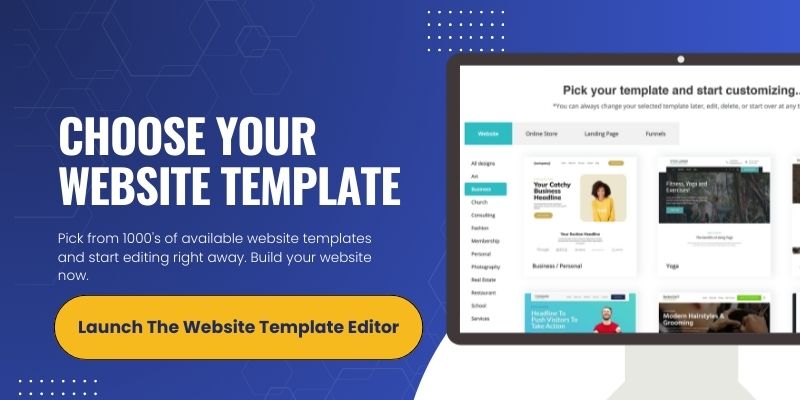Hey there! So, you’re looking to create a website but don’t know where to start? I’ve been in that boat before, and trust me, I feel your pain. That’s why I’m excited to share with you six easy-to-use website builders that will help you put together a polished site without having to become a coding wizard. Let’s dive right in!
Intuitive User Interface
Simplicity is Key
One of the first things I always look for in a website builder is how intuitive the user interface is. After all, you want to spend your time building a website, not figuring out how to use the tool. Several platforms go above and beyond by providing drag-and-drop capabilities, making it super easy for anyone, regardless of technical skill, to get started.
From my personal experience, the simpler the interface, the quicker I can get a project off the ground. I’ve tried some platforms that had steep learning curves, and honestly? It just wasn’t worth the headache. So, when looking for a website builder, check out some reviews to see how other users feel about the user interface.
When you find a platform that feels comfortable for you, you’ll be amazed at how productive you can be. An intuitive interface allows for easy navigation, making it a breeze to design and update your website as needed.
Pre-Made Templates
Templates can be a total game-changer. Personally, I love a good template that’s already pre-designed and ready for customization. With a strong collection of templates, you can quickly pick one that matches your style or personality without having to start from scratch.
More often than not, templates are customizable, so you can tweak colors, fonts, images, and layouts. I’ve found that the best website builders allow you to edit these elements while keeping the overall look cohesive—just like putting the icing on a cake!
Having templates means you’ll save loads of time on design. Plus, many platforms ensure their templates are mobile-friendly, so your website will look great on any device, and we all know how important that is these days!
Adjustable Layout Options
Another aspect I appreciate is the flexibility in layout options. Some platforms offer grid layouts, column variations, and even custom positioning for elements. This flexibility means you can create a unique visual appeal that reflects your brand.
Having adjustable layouts allows me to experiment a little bit. I love taking my time to design a page exactly the way I envision it in my mind. Plus, it’s fun to play around and see what works best!
Also, being able to adjust the layout can significantly influence user experience, keeping visitors engaged and making it easier for them to find what they need on your site.
Responsive Design
Importance of Mobile Compatibility
Today, a large portion of web traffic comes from mobile devices. I can’t stress enough how vital it is for your website to look great on smartphones and tablets. When I first started, I ignored mobile compatibility, and let’s just say, it wasn’t a pretty sight!
Most reputable website builders automatically create a responsive design that adjusts to different screen sizes. When you pick a builder for your site, make sure to check its mobile capabilities. Trust me, you do not want users squinting at your text or pinching their screens to zoom in.
Testing your site on various devices before launch is crucial. Many platforms allow you to preview how your site will look on mobile and desktop. Take advantage of this to ensure your hard work isn’t lost on a less-than-ideal user experience!
SEO Optimization Features
Okay, let’s chat about SEO. Having a great-looking site is one thing, but if people can’t find it, then what’s the point, right? Many modern website builders come with built-in SEO optimization tools that are a lifesaver.
These tools often include meta tags, alt text for images, and customizable URLs. I remember when I manually coded these elements for my first website, and it was like pulling teeth! Now, I can simply punch in the info, and the platform handles the rest.
Utilizing these features will help make your site easier to find on search engines, which is critical for attracting visitors. Plus, it gives you a leg up in the competitive online space!
Comprehensive Support and Documentation
Let’s face it; you’re gonna run into hiccups. I mean, it’s me we’re talking about! Having reliable customer support is something I never take for granted. Some builders offer forums, tutorials, and one-on-one support, which has been invaluable for me.
I’ve been able to get answers to my questions pretty quickly, helping me to troubleshoot issues without having to turn to Google Search and read outdated forum threads.
The best part? Many platforms have rich documentation to guide you through common challenges. So, if you’re a bit of a self-starter, you can usually find step-by-step guides to solve problems without losing your mind.
Affordability
Free vs. Paid Plans
While I love the idea of free platforms, I’ve learned that it’s often worth investing in a paid plan if you want to grow. Most website builders offer both free and premium options, and it’s crucial to weigh what you truly need against your budget.
In my early days, I went with a free plan but found myself limited on storage and features. Eventually, I feel that I needed to invest to create a professional image. Some things really are worth the investment—like branding!
Check what features are available on both plans and see if the paid options are worth the added cost. I promise you, you might be surprised by how much you need that extra kick!
Value for Money
When I look at website builders, I always keep an eye on what kind of bang I get for my buck. It’s important to analyze the features you’re paying for against what other platforms offer. You want quality, functionality, and value.
Some platforms may seem pricey at first, but when you consider all the features, support, and benefits you receive, the value often outweighs the cost. I’ve found certain higher-priced options to be lifesavers, loading my site with everything I need without extra charges for essential features!
Do your research, and don’t hesitate to make comparisons. A little bit of time spent here can save you a lot of money and frustration down the line!
Discounts and Promotions
Sometimes builders offer great discounts or promotions for signing up for a yearly plan instead of a monthly one. I’ve taken advantage of these deals more than once, and they can be incredibly beneficial! It’s like finding a hidden gem.
Keeping an eye out for seasonal discounts can also help you save. Platforms often run promotions during Black Friday or at the beginning of the year. Watching for these deals can save you a pretty penny!
When budget constraints are tight, leveraging discounts and promotions can make building your site far more manageable and less stressful.
Customization Options
Flexible Design Choices
Customization is essential for making your website feel unique. I’ve worked with a few platforms that offer a staggering amount of design choices. Whether you want to modify color schemes, experiment with fonts, or rearrange elements, the possibilities are endless!
When a website builder gives me those creative freedoms, it sparks joy! I love being able to tailor each aspect to create a more personal connection with my audience.
It’s also important for brands; a strong visual identity helps to further establish credibility and professionalism. So, remember to explore customization options thoroughly; your ideal site is often just a few clicks away!
Third-Party Integrations
Let’s talk integration. A great website builder should also seamlessly connect to third-party applications that you already use or plan to use. Whether it’s social media tools, email marketing, or analytics, these integrations can seriously enhance functionality!
For instance, I once built a site using a platform that easily integrated with my email marketing provider, and it took my marketing to the next level. Real-time integrations allow you to track performance and reach your audience without extra setups.
Make sure to check the website builder you choose for compatibility with your must-have applications. It’ll save you a lot of hassle and keep everything running smoothly!
Testing and Feedback Options
Lastly, user feedback can be invaluable. I love that some platforms allow me to preview changes in real-time and invite others to help test the site before I launch it. Getting fresh eyes on your design can help identify user experience issues that you might overlook!
Furthermore, platforms that enable A/B testing can give you meaningful insights into how your audiences will respond to various designs or content adjustments. I wish I’d known about A/B testing earlier—it’s such a powerful tool!
Utilizing testing features can facilitate effective decision-making and improve overall site performance. So, be sure to explore this feature before rolling out your final design!
Conclusion
Creating a website doesn’t have to be a daunting task. By focusing on factors like user-friendly interfaces, responsive design, and customization options, you can build a site that represents you without breaking a sweat. Happy building!
Frequently Asked Questions
1. What are the top platforms recommended for building a website?
The article discusses six popular website builders known for their ease of use, intuitive designs, and customization options, ensuring there’s something to fit everyone’s needs.
2. Are free website builders reliable?
While many free website builders are reliable, they often come with limitations in storage, features, and branding. It’s usually worth considering a paid plan for more professional results.
3. Do I need coding skills to use these builders?
Nope! One of the main perks of these platforms is that they are designed for users with little to no coding experience. Drag-and-drop features make website creation simple and fun!
4. Can I integrate third-party tools with my website?
Definitely! Most website builders support integrations with third-party applications, allowing you to connect social media, analytics tools, and email marketing platforms easily.
5. How important is mobile responsiveness for my website?
Mobile responsiveness is incredibly important! With a large amount of web traffic coming from mobile devices, ensuring your site looks great on all screen sizes is essential for user experience.

